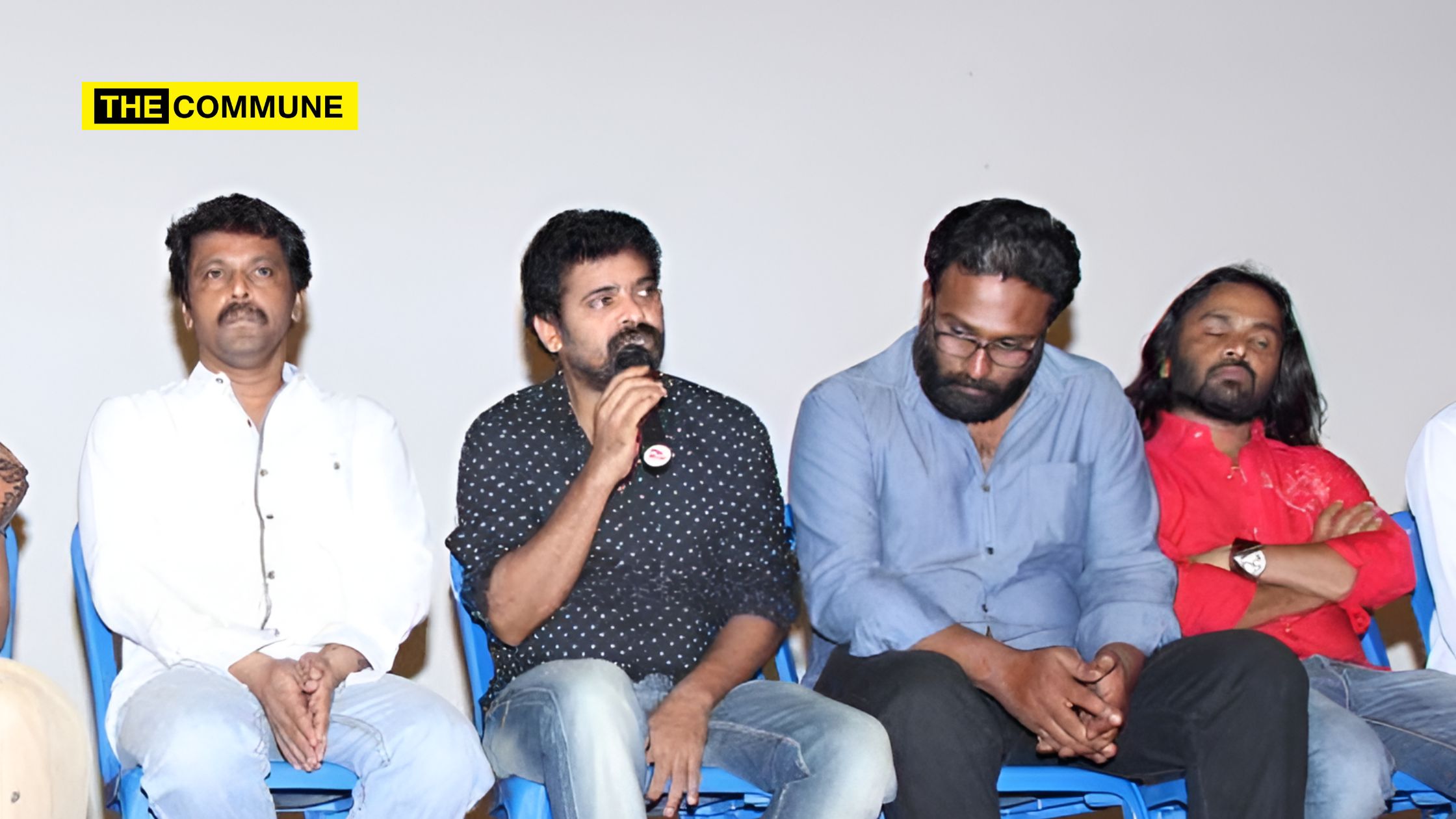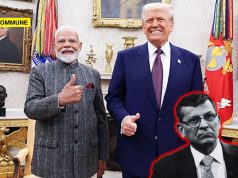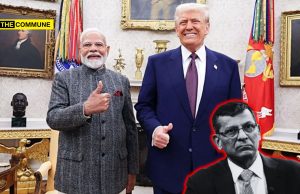
Dravidianist filmmakers, who portray Brahmin families as oppressive patriarchs while advocating rebellion against them as the only path to “liberation” seem to reject the very ideals of anti-caste rebellion that they push onscreen when it comes to their own families. Examples like director Cheran’s reaction to his daughter’s inter-caste relationship and actor Sathyaraj’s insistence on caste-endogamous marriage for his son highlight the glaring double standards within Dravidianist circles.
This controversy raises a fundamental question: If personal choice and inter-caste love are so sacred to Dravidianist filmmakers, why do they resist them in their households? The selective application of their so-called progressive ideals suggests that their real intent is not social reform but a sustained campaign to undermine Tamil Brahmin culture while shielding their interests.
The recent release of the Dravidianist propaganda film Bad Girl has sparked outrage, particularly among Tamil Brahmins, as it appears to be yet another targeted attempt to malign their community under the guise of “progressive” storytelling.
The film glorifies a female protagonist who abandons her “conservative” family—portrayed as Tamil Brahmins—to indulge in a so-called liberated lifestyle filled with multiple partners and vice-filled choices. The narrative deliberately seeks to undermine traditional Tamil values, particularly the principle of chastity, which has historically been upheld for both men and women in Tamil society. Critics argue that such films are not merely about “women’s liberation” but rather a thinly veiled attack on Tamil Brahmin identity and values, reinforcing the Dravidianist agenda of distorting cultural norms to suit their ideological motives.
This backlash has reignited discussions about the hypocrisy of Dravidianist and Periyarist ideologues, who, while claiming to champion women’s freedom, selectively target Tamil Brahmin culture in their films. They conveniently paint upper-caste families—particularly Brahmins—as oppressive patriarchs while portraying rebellion against these families as the only path to true liberation. However, these same filmmakers and ideologues exhibit stark hypocrisy when it comes to their own personal lives.
Dravidianist cinema frequently highlights inter-caste marriages and honor killings, positioning themselves as crusaders against casteism. Yet, they deliberately ignore a critical reality: many so-called love stories are often strategic, where men from other communities seek relationships especially with Brahmin women out of perversion and a false feeling of superiority rather than genuine affection. This is an angle that Dravidianist filmmakers refuse to acknowledge because it does not fit their politically motivated narratives. Instead, their films repeatedly frame women as passive victims of “Brahminical patriarchy” while ignoring the agency and concerns of their own families.
The hypocrisy becomes even more glaring when these very Dravidianist filmmakers are faced with inter-caste marriages in their own households. Far from practicing the ideals they espouse on screen; they fiercely oppose such unions when it involves their own daughters or sons. One example is Sathyaraj who waxes eloquent on EV Ramasamy Naicker’s principles but ensures that his son marries within the caste. Another prime example of this contradiction was evident in the controversy surrounding director Cheran’s daughter’s inter-caste marriage. While Cheran and Dravidianist filmmaker Ameer Sultan have long promoted inter-caste love in their films, their real-life reactions exposed their double standards—quickly rejecting the idea of such marriages when it involved their own families.
This blatant hypocrisy raises an important question: if inter-caste love and personal choice are so sacred to Dravidianist ideologues, why do their convictions crumble when it comes to their own daughters? The selective application of their so-called “progressive” ideals exposes the true intent behind their propaganda—not genuine social reform, but a sustained campaign to attack Tamil Brahmin culture while conveniently preserving their own status and interests.
The Cheran Story
In 2013, director Cheran faced a difficult situation when his daughter, Damini, told the court that she would prefer to stay with her boyfriend’s family. Cheran opposed her relationship with Chandru, a dancer on a reality show, claiming that he had previously deceived several women and had even proposed to Cheran’s elder daughter through a social networking site. However, Damini, who had filed a police complaint against her father for allegedly intimidating her boyfriend, told the court that she wished to live with her “would-be” mother-in-law.
Damini made this statement before a Division Bench, which included Justices V. Dhanapalan and C.T. Selvam, during a hearing of a habeas corpus petition filed by Chandru’s mother. Easwari Ammal, Chandru’s mother from Choolaimedu, stated that her son and Damini were in love and asked the court to direct the police to release Damini from the Vigilance Home in Mylapore and allow her to join her boyfriend’s family. When Damini was produced in court, she confirmed that she was 20 years old, single, and wanted to live with her boyfriend’s family rather than remain in the Vigilance Home. The Bench then questioned Cheran and his wife, who became emotional in court. Cheran objected to his daughter going with her boyfriend’s mother and suggested that the court hold private proceedings to understand the true situation.
During a press conference expressing his opposition to his daughter’s relationship, Cheran said, “This is not something that happened to one father—such situations occur in many places. We can’t say whether it’s due to the changing world, the youth’s outlook, or the growth of connectivity and technology that wasn’t available in the past. We are here today because we, as parents, respected our daughter’s freedom and opinions, treating her as a friend without exercising authority over her. We’ve all talked about giving children the freedom of expression, treating them as friends, and listening to what they have to say. Love is not wrong, and we should accept it. Parents should encourage love by guiding their children, but we shouldn’t try to be their parents. In many films, we have created scenes and discussions around this very topic, and we’ve spoken about it on many stages.”
He then recounted how his first daughter understood the values they preached, but the second daughter, involved in the dispute, had a rebellious attitude. He said, “First of all, it’s not wrong for children to fall in love. But the question is, what kind of love is it, and is it the right kind? As far as we are concerned, when our daughter fell in love, we didn’t oppose it; we accepted it. We guided her, saying that it wasn’t wrong, but she needed to choose wisely. When we investigated the man’s background for the first time, we learned about his family situation, which caused concern for us. However, I conveyed to my wife that when we came to Chennai, we lived in a 10×10 home, and in that small space, we raised two children. So, we shouldn’t judge anyone by their current situation—life can change tomorrow. I’m not opposing this love, but I do want her to maintain some distance. My daughter is still studying and has three more years to finish her education, while the boy has no job and no permanent source of income. He lives with his mother, who is a heart patient. When I gave him the three years’ time, I told him, ‘My daughter must finish her studies and get her degree. If you put in effort over these three years, you can reach a certain level too. If you do something to earn a monthly income of 10,000 or 15,000, you can come to my home as my son-in-law without any inferiority complex. But if you don’t, you’ll become like the character ‘Solla Marantha Kadhai’s Sivadhanu, and that’s not something to be proud of for my daughter and you should not become one. For my daughter, is it pride that my husband is looking after me, or that my husband is working under my father? No need, first achieve something in these three years, but without continuing to be in contact with my daughter.’ Yet, he continued to speak with her on the phone and even tried to take her out. When they do all that after reprimanding them, it creates a bad opinion towards them.”
He continued, saying, “I called their parents and told them that these things happen—falling in love is normal, and I allowed it. But even after I advised him, your son continues to take her out. I’m reprimanding my daughter, but she doesn’t listen to me. I don’t know if he’s forcing her or if she’s the one pursuing him, but they’re still going out, which is wrong. This will affect both their lives, and in the future, the outcome will be bad. He won’t be able to live properly and will end up chasing my daughter, getting insulted. If they experience everything now, what will they have left after marriage? If they wait until marriage, their future will be happy. But if they get married and then face problems comes and stand within three months of marriage, it won’t be good. So, please tell your son not to meet her, and I will say the same to my daughter. After three years, we will talk again.”
Cheran then accused the boy’s family of conspiring to separate his daughter from him. He later criticized the boy’s character, claiming that he had been speaking to many other girls and used manipulative tactics to influence his daughter for his own benefit.
Supporting Cheran’s opposition to his daughter’s relationship, Dravidianist director Ameer Sultan stated, “The boy is the perfect culprit, and it’s not just him—his entire family is accused. I urge the authorities to investigate the boy’s family background, as many families have already been destroyed because of him. Two years ago, at the KK Nagar police station, a woman—whose details I know but won’t disclose here, I don’t know where and how she leads a life, and I cannot disturb her life—was involved in a case that reached a settlement similar to this. There were two other girls connected to this case, making it a total of three victims. It’s not just the boy; the whole family is complicit in this behavior.”
Dravidianist filmmakers relentlessly push narratives that encourage young women, particularly from Tamil Brahmin families, to rebel against their traditions, reject parental guidance, and engage in reckless relationships. These films glorify defiance, portraying chastity and cultural values as oppressive burdens rather than cherished ideals that have preserved Tamil society for generations.
But here lies the ultimate hypocrisy—while these filmmakers and ideologues urge Tamil Brahmin women to discard their values and embrace so-called “liberation,” would they ever ask their own daughters to follow the same path? Would they celebrate if their own family members were drawn into the very chaos they promote on screen? The double standards are glaring, and Tamil Brahmins continue to be the convenient targets of this ideological assault.
ஒரு பெண் குழந்தையை பெற்ற @directorcheran அவர்களின் ஆதங்கம் நன்றாக உணர முடிகிறது, அவரது பெண் குழந்தையை அவர் போராடி மீட்டதில் மிக்க மகிழ்ச்சி. அதற்கு துணையாக தமிழ் சினிமா இயக்குனர்கள் பலர் இருந்தது பாராட்டதக்கது.
இப்போ @dir_vetri @beemji @VijaySethuOffl @karupalaniappan அமீர்… pic.twitter.com/2XpzzgFl3T
— Arvinth Easwaran (@arvinth_e) January 28, 2025
Subscribe to our Telegram, WhatsApp, and Instagram channels and get the best stories of the day delivered to you personally.




